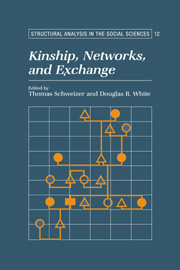Book contents
- Frontmatter
- Contents
- Preface
- List of contributors
- 1 Revitalizing the Study of Kinship and Exchange with Network Approaches
- I Representing Kinship Dynamics, Material Flow, and Economic Cooperation
- II Individual Embeddedness and the Larger Structure of Kinship and Exchange Networks
- III Marriage, Exchange, and Alliance: Reconsidering Bridewealth and Dowry
- IV Emergence, Development, and Transformation of Kin-Based Exchange Systems
- Index
III - Marriage, Exchange, and Alliance: Reconsidering Bridewealth and Dowry
Published online by Cambridge University Press: 05 November 2011
- Frontmatter
- Contents
- Preface
- List of contributors
- 1 Revitalizing the Study of Kinship and Exchange with Network Approaches
- I Representing Kinship Dynamics, Material Flow, and Economic Cooperation
- II Individual Embeddedness and the Larger Structure of Kinship and Exchange Networks
- III Marriage, Exchange, and Alliance: Reconsidering Bridewealth and Dowry
- IV Emergence, Development, and Transformation of Kin-Based Exchange Systems
- Index
Summary
As a prolific economist-turned-anthropologist, Duran Bell creates an underlying theoretical dialogue with ethnographers such as Rao and Dietrich over our understandings of exchange and alliance-formation occasioned by marriage. These introductory remarks play on this dialogue in hopes that debate over these issues will enrich the theoretical capabilities of anthropology in its interface with economics. Two considerations help to prepare for a close reading of Bell's work. First, his definitions – and the assumptions of his exchange models – derive from a meticulous reading of ethnographic materials. Second, his models are also closely derived deductively, on the assumption that all forms of social transaction between parties with different interests, including gift-giving, have an exchange basis. Obligatory relationships such as inheritance, although they are transactions, do not constitute exchange as Bell and others define it. Bell's concepts are formal in the strict economic sense, but his approach is virtually unique among economists: He accepts the ethnographic postulate that there exist corporate groups and customary obligations that we must take as social givens. These formal relations and structures have their own logical consequences, which are independent of the axiom of methodological individualism (but, like Bollig in Chapter 7, he believes they may also have a rational basis). Bell's work tries to elucidate these consequences by integrating the study of substantive personal rights into formal economics; and in doing so, he expands the field of economics and the importance of its intersection with anthropology. He has rigorously combined strictly formal and substantive/inductive approaches to economic and social anthropology.
- Type
- Chapter
- Information
- Kinship, Networks, and Exchange , pp. 179 - 186Publisher: Cambridge University PressPrint publication year: 1998



